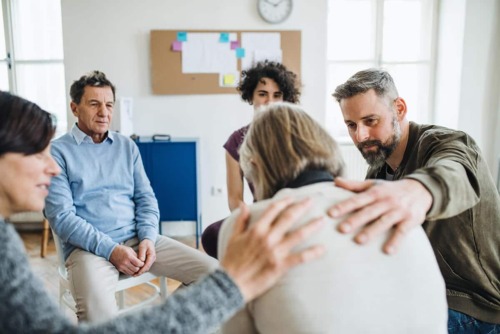Several group therapy programs can help you process your addiction and move forward. At Kemah Palms Recovery®, we work with multiple therapeutic options that help people heal in a group framework.
Discussing the underlying issues that contribute to addiction with a licensed psychotherapist in a group setting has many benefits for recovering addicts. Hearing the experiences of others who have been in similar situations can allow you to form interpersonal links with group members suffering from substance abuse disorders. As you express yourself, you can integrate the perspectives and instructions of the therapist and other group members. This will create the building blocks for constructive future behavior. Over time, you will learn new coping strategies for stressful situations. Instead of relying on addictive substances, you can learn to identify trigger issues and appropriate reactions.
Understanding the Different Types of Group Therapy
Talking with other addicts about traumatic experiences causing or resulting from addiction reduces some of the shame that former addicts like yourself may feel. It also helps you to know that you are not alone. Group discussion therapy is a tool for improving conflict resolution and communication skills in a safe, nonjudgmental environment. Learning about the types of group therapy for addiction can help you develop a program that works for you.
Group Therapy in Conjunction With Chronic Pain Management
Chronic pain is a leading cause of opiate addiction. The chronic pain management program, under the supervision of Dr. Flowers, teaches you how to manage pain levels without resorting to the use of addictive opiates. The program treats all aspects of pain management, including spiritual, mental and physical aspects. Group therapy sessions build relationships with peers. Over time, you will learn the signs of over-medicating. Many addicts do not realize that their pain management regimen has become an addiction until it is too late.
Chronic pain also contributes to feelings of loneliness and isolation that can fuel addictive behaviors. A combination of chronic pain management and group therapy teaches you to reach out to others and seek help. Learning about fellow addicts in group therapy leads to friendship bonds that build a support system as a buffer against future relapses. Valuable relapse prevention strategies are taught through our various treatment programs. Inpatient addiction treatment allows you the time and support needed to regain control of your life.
Group Relapse Prevention Therapy
Relapse Prevention Therapy (RPT) is a cornerstone of group therapy. Unfortunately, statistics show that relapses are common among addicts, even after completing a treatment program. That’s why group therapy utilizes RPT tools to help addicts in achieving and maintaining sobriety in the long term. High-risk situations emerge from negative emotions and peer pressure to drink or use drugs. As time passes, you will eventually become more capable of assessing high-risk situations and abstaining from drug use.
RPT is important because it gives you coping skills to deal with life’s challenges and anticipate high-risk situations before they occur. Relapse has several warning signs. If you can recognize those signs and deal with them, then you will be capable of preventing your own relapse and maintaining your sobriety. RPT will also prepare you to return to treatment and recovery if you do slip back into addiction.
Family-Centered Group Therapy
The family unit is a key support system for recovering addicts. Addiction extends from the substance abuser and touches immediate family members and relatives. In some cases, family issues might even be the underlying reason for the addiction. These are some reasons why family-centered group therapy can be one of the most important types of group therapy for addiction for people receiving addiction treatment therapy in Kemah, TX.
Your family members can be classified into two distinct groups of people: the enablers and the victims. Victims of your addiction are the relatives and close friends you have hurt, physically or emotionally, because of the behaviors linked to your substance abuse. Enablers facilitate your addiction by providing financial support or failing to intervene. During family therapy, you will be granted a chance to begin to repair the damage that your addiction has wrought on your loved ones, and family members will gain insight into the struggles that you are dealing with as an addict.
If you’re struggling with addiction and you want a change, we can help. Call Kemah Palms Recovery® today to get on the road to your recovery from addiction.







